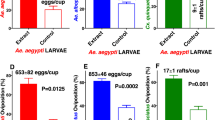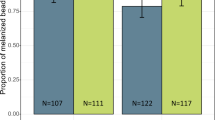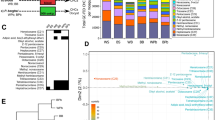Abstract
WE have obtained two colonies of Anopheles atroparvus by selecting for escaping (colony A) and not escaping (colony B) from a tube lined with paper impregnated with DDT dissolved in ‘Risella’ oil1, and this selection has now reached the F32 generation. Percentages of escapes, which differed widely in both males and females, have not changed significantly since the tenth generation. Neither DDT nor its solvent has been found to be essential for the escape reaction, but each greatly enhances the response.
This is a preview of subscription content, access via your institution
Access options
Subscribe to this journal
Receive 51 print issues and online access
$199.00 per year
only $3.90 per issue
Buy this article
- Purchase on Springer Link
- Instant access to full article PDF
Prices may be subject to local taxes which are calculated during checkout
Similar content being viewed by others
References
Gerold, J. L., and Laarman, J. J., Nature, 204, 500 (1964).
Author information
Authors and Affiliations
Rights and permissions
About this article
Cite this article
GEROLD, J., LAARMAN, J. Behavioural Responses to Contact with DDT in Anopheles atroparvus. Nature 215, 518–520 (1967). https://doi.org/10.1038/215518a0
Received:
Published:
Issue Date:
DOI: https://doi.org/10.1038/215518a0
Comments
By submitting a comment you agree to abide by our Terms and Community Guidelines. If you find something abusive or that does not comply with our terms or guidelines please flag it as inappropriate.



